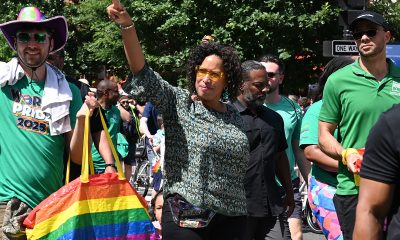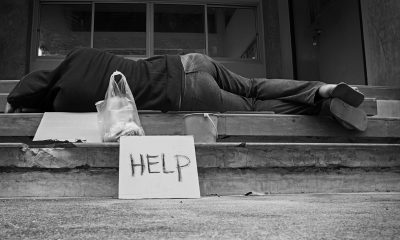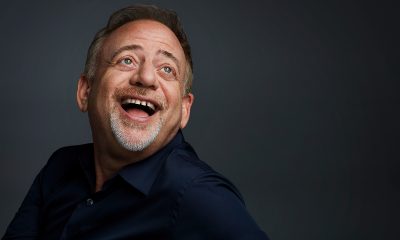District of Columbia
GLAA announces ratings for D.C. Council candidates
Janeese Lewis George, Robert White, Nate Fleming receive highest marks
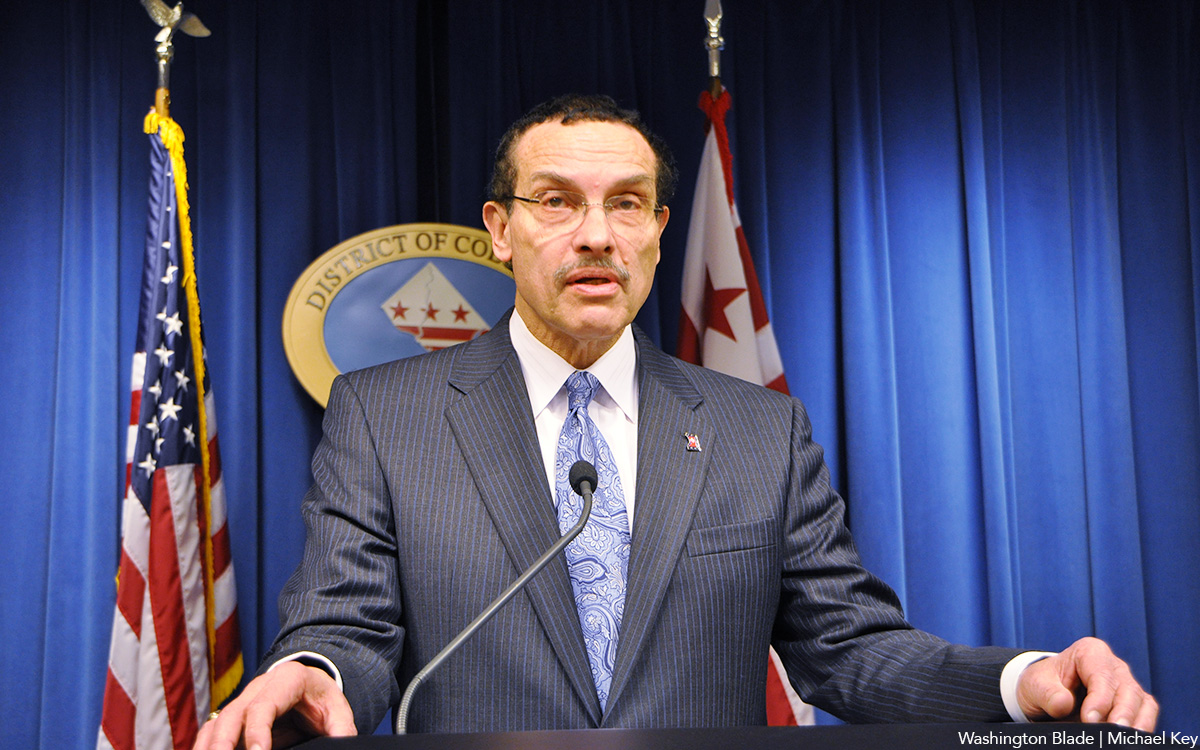
GLAA D.C., formerly known as the Gay & Lesbian Activists Alliance of Washington, announced on May 13 that it has awarded its highest ratings for D.C. Council candidates running in the city’s June 4 primary election to incumbent Council members Janeese Lewis George (D-Ward 4) and Robert White (D-At-Large) and to Ward 7 Democratic candidate Nate Fleming.
On a rating scale of +10, the highest possible rating, to -10, the lowest rating, GLAA awarded ratings of +9.5 to Lewis George, + 9 to Robert White, and +8.5 to Fleming.
Fleming is one of 10 candidates running in the Democratic primary for the Ward 7 Council seat, which is being vacated by incumbent Council member and former D.C. Mayor Vincent Gray, who is not running for re-election. In addition to Fleming, GLAA issued ratings for seven other Ward 7 Democratic contenders who, like Fleming, returned a required GLAA candidate questionnaire.
The remaining two Ward 7 candidates were not rated under a GLAA policy adopted this year of not rating candidates that did not return the questionnaire, the responses to which GLAA uses to determine its ratings, according to GLAA President Tyrone Hanley. A statement accompanying the GLAA ratings shows that it rated 13 D.C. Council candidates – all Democrats — out of a total of 18 Council candidates on the June 4 primary ballot.
Ballot information released by the D.C. Board of Elections shows that only one Republican candidate and one Statehood Green Party candidate is running this year for a D.C. Council seat. GOP activist Nate Derenge is running for the Ward 8 seat held by incumbent Democrat Trayon White and Statehood Green Party candidate Darryl Moch is running for the At-Large Council seat held by Robert White.
GLAA shows in its ratings statement that neither Trayon White nor Derenge nor Moch returned the questionnaire, preventing them from being rated. However, one of two Democratic candidates running against Tryon White in the primary — Salim Aldofo — did return the questionnaire and received a rating of +5.5. The other Democratic candidate, Rahman Branch, did not return the questionnaire and was not rated. Trayon White has been a supporter on LGBTQ issues while serving on the Council.
GLAA President Hanley said GLAA this year decided to limit its ratings to candidates of all political parties running for D.C. Council seats. In addition to candidates running for an At-Large Council seat and Council seats in Wards 4, 7, and 8, the June 4 primary ballot includes candidates running for the D.C. Congressional Delegate seat, the Shadow U.S. House seat, and the Shadow U.S. Senate seat. GLAA chose not to issue ratings for those races, according to Hanley. He said during mayoral election years, GLAA rates all candidates for mayor.
The Capital Stonewall Democrats, D.C’s largest local LGBTQ political organization, was scheduled to release its endorsements of D.C. Council candidates and candidates for all other local D.C. races, including Congressional Delegate and Senate and House “shadow” races, at a May 21 endorsement event. The Blade will report on those endorsements in an upcoming story.
Like in all past years beginning in the early 1970s when GLAA began rating candidates in local D.C elections, the group has not rated federal candidates, including those running for U.S. president. Thus, it issued no rating this year for President Joe Biden and two lesser-known Democratic challengers appearing on the D.C. presidential primary ballot on June 4 – Marianne Williamson and Armando Perez-Serrato.
In the At-Large Council race, GLAA gave Robert White’s sole Democratic challenger, Rodney Red Grant, who returned the questionnaire, a rating of +3.5.
“The ratings are based solely on the issues and may not be interpreted as endorsements,” GLAA says in its statement accompanying the ratings. The statement says the ratings are based on the candidates’ response to the questionnaire, the questions for which GLAA says reflect the group’s positions on a wide range of issues as stated in a document it calls “A Loving Community: GLAA Policy Brief 2024.” It sends a link to that document to all candidates to whom it sends them the questionnaire and urges the candidate to seek out the brief “for guidance and clarification” in responding to the questions. GLAA says the ratings are also based on the candidates’ record on the issues GLAA deems of importance, including LGBTQ issues.
Like its questionnaire in recent years, this year’s nine-question questionnaire asks the candidates whether they would support mostly non-LGBTQ specific issues supported by GLAA, some of which are controversial. One of the questions asks the candidates, “Do you support enacting legislation to decriminalize sex work for adults, including the selling and purchasing of sex and third-party involvement not involving fraud, violence, and coercion?”
Another question asks if the candidates would support decriminalizing illegal drug use by supporting “removing the criminal penalties for drug possession for personal use and increasing investments in health services.” Other questions ask whether candidates would address “concentrated wealth in the District by raising revenue through taxing the most wealthy residents,” would they support funding for “harm reduction and overdose prevention services to save lives,” and would they support a Green New Deal for Housing bill pending before the D.C. Council that would “Socialize Our Housing” to address putting in place city subsidized housing for those in need.
One of the questions that might be considered LGBTQ specific asks whether candidates would support sufficient funding for the D.C. Office of Human Rights to ensure the office has enough staff members to adequately enforce the city’s nondiscrimination laws and to end a discrimination case backlog that the office sometimes encounters.
Some activists have criticized GLAA for not including more LGBTQ-specific questions in its questionnaire. Others have defended the questionnaire on grounds that D.C. long ago has passed a full range of LGBTQ supportive laws and most if not, all serious candidates running in D.C. for public office for the past 20 years or more have expressed strong support for LGBTQ equality. They argue that LGBTQ voters, while weighing the depth of support candidates have on LGBTQ issues, most of the time base their vote on a candidate’s record and position on non-LGBTQ issues when all candidates in a specific race are LGBTQ supportive.
Hanley told the Washington Blade GLAA believes the current questionnaire addresses the issues of importance to the largest number of LGBTQ D.C. residents.
“My response is that we care about whatever issues are impacting queer and trans people,” Hanley said. “We can’t isolate the challenges we are experiencing as queer and trans people to things that are specifically related to our identity as queer and trans people because they are all interconnected,” he said.
“So, how will I tell a Black trans woman we care about her not being discriminated against at her job for being trans, for being Black, or for being a woman, but we don’t care that she doesn’t have housing? Hanley asked. “To me, that seems like a very inhumane way of thinking about human beings because we are whole human beings,” he said, some of whom, he added, face a wide range of issues such as homelessness, drug issues, and “struggling to make ends meet.”
The GLAA statement that accompanies its ratings, which is posted on its website, includes links to each of the candidates’ questionnaire responses as well as an explanation of why it gave its specific rating to each of the candidates. In its explanation section GLAA says all the candidates expressed overall support for the LGBTQ community and expressed support for the concerns related to the issues raised by the questions even if they were not at this time ready to back some of the issues like decriminalization of sex work.
Following are the GLAA ratings given to 12 Democratic D.C. Council candidates and one “unknown” candidate that Hanley says submitted their questionnaire but did not reveal their identity on the questionnaire:
DC Council At-Large
Robert White: +9
Rodney Red Grant: +3.5
DC Council Ward 4
Janeese Lewis George: +9.5
DC Council Ward 7
Ebony-Rose Thompson: +4.5
Ebony Payne: +5
Kelvin Brown: +2.5
Nate Fleming: +8.5
Roscoe Grant Jr.: +3.5
Veda Rasheed: +5
Villareal VJ Johnson II: +4
Wendell Felder: +2
DC Council Ward 8
Salim Aldofo: +5.5
Unknown: +2
The full GLAA ratings, a breakdown of the ratings based on a GLAA rating criteria, the candidate questionnaire response, and GLAA’s explanation for each of its candidate ratings can be accessed at the GLAA website.
District of Columbia
D.C. pays $500,000 to settle lawsuit brought by gay Corrections Dept. employee
Alleged years of verbal harassment, slurs, intimidation

The D.C. government on Feb. 5 agreed to pay $500,000 to a gay D.C. Department of Corrections officer as a settlement to a lawsuit the officer filed in 2021 alleging he was subjected to years of discrimination at his job because of his sexual orientation, according to a statement released by the American Civil Liberties Union of D.C.
The statement says the lawsuit, filed on behalf of Sgt. Deon Jones by the ACLU of D.C. and the law firm WilmerHale, alleged that the Department of Corrections, including supervisors and co-workers, “subjected Sgt. Jones to discrimination, retaliation, and a hostile work environment because of his identity as a gay man, in violation of the D.C. Human Rights Act.”
Daniel Gleick, a spokesperson for D.C. Mayor Muriel Bowser, said the mayor’s office would have no comment on the lawsuit settlement. The Washington Blade couldn’t immediately reach a spokesperson for the Office of the D.C. Attorney General, which represents the city against lawsuits.
Bowser and her high-level D.C. government appointees, including Japer Bowles, director of the Mayor’s Office of LGBTQ Affairs, have spoken out against LGBTQ-related discrimination.
“Jones, now a 28-year veteran of the Department and nearing retirement, faced years of verbal abuse and harassment from coworkers and incarcerated people alike, including anti-gay slurs, threats, and degrading treatment,” the ACLU’s statement says.
“The prolonged mistreatment took a severe toll on Jones’s mental health, and he experienced depression, Post-Traumatic Stress Disorder, and 15 anxiety attacks in 2021 alone,” it says.
“For years, I showed up to do my job with professionalism and pride, only to be targeted because of who I am,” Jones says in the ACLU statement. “This settlement affirms that my pain mattered – and that creating hostile workplaces has real consequences,” he said.
He added, “For anyone who is LGBTQ or living with a disability and facing workplace discrimination or retaliation, know this: you are not powerless. You have rights. And when you stand up, you can achieve justice.”
The settlement agreement, a link to which the ACLU provided in its statement announcing the settlement, states that plaintiff Jones agrees, among other things, that “neither the Parties’ agreement, nor the District’s offer to settle the case, shall in any way be construed as an admission by the District that it or any of its current or former employees, acted wrongfully with respect to Plaintiff or any other person, or that Plaintiff has any rights.”
Scott Michelman, the D.C. ACLU’s legal director said that type of disclaimer is typical for parties that agree to settle a lawsuit like this.
“But actions speak louder than words,” he told the Blade. “The fact that they are paying our client a half million dollars for the pervasive and really brutal harassment that he suffered on the basis of his identity for years is much more telling than their disclaimer itself,” he said.
The settlement agreement also says Jones would be required, as a condition for accepting the agreement, to resign permanently from his job at the Department of Corrections. ACLU spokesperson Andy Hoover said Jones has been on administrative leave since March 2022. Jones couldn’t immediately be reached for comment.
“This is really something that makes sense on both sides,” Michelman said of the resignation requirements. “The environment had become so toxic the way he had been treated on multiple levels made it difficult to see how he could return to work there.”
District of Columbia
D.C. non-profits find creative ways to aid the unhoused amid funding cuts
City’s poor economic mobility makes it easier to slip into homelessness
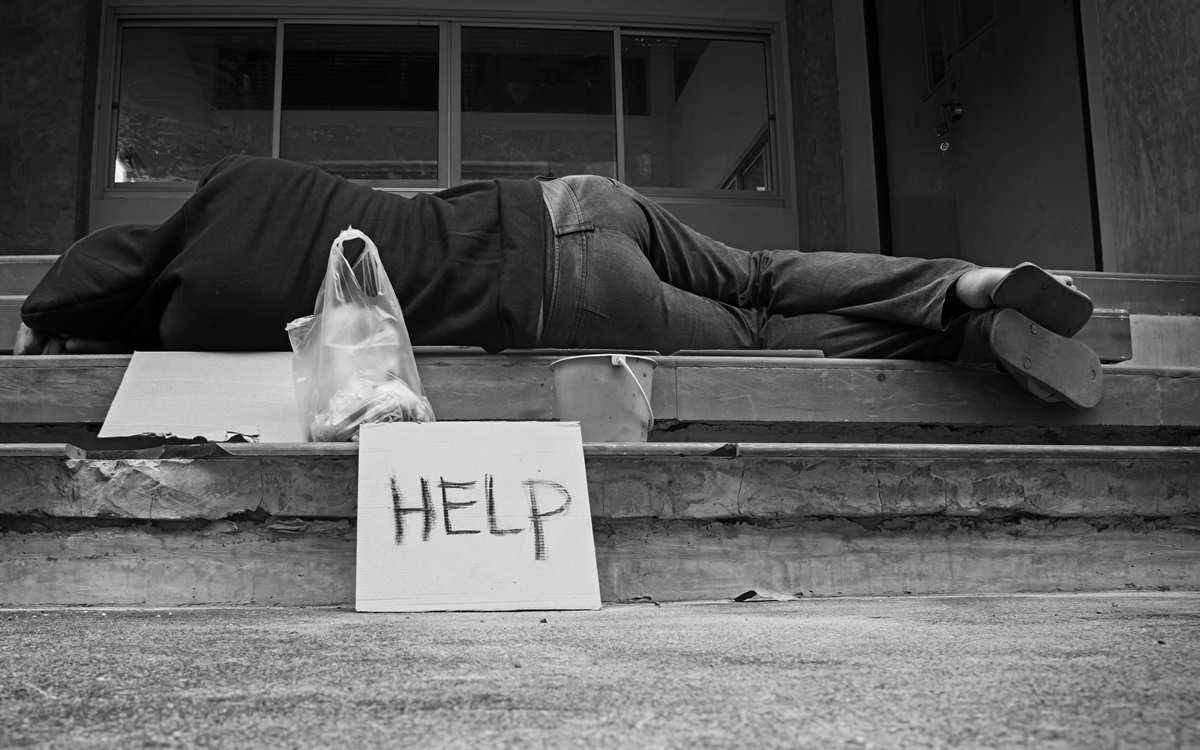
Homelessness is unlikely to disappear entirely, but it can be minimized and controlled.
That principle guides Everyone Home Executive Director Karen Cunningham’s approach to homeless support and prevention in D.C.
“There’s always going to be some amount of people who have a crisis,” Cunningham said. “The goal is that if they become homeless, [it’s] rare, brief and non-recurring. And in order for that to be the case, we need to have steady investments in programs that we know work over time.”
Making those investments has proven to be an unprecedented challenge, however. Cunningham said non-profits and other organizations like Everyone Home are grappling with government funding cuts or stalls that threaten the work they do to support D.C.’s homeless population.
Despite a 9% decrease in homelessness from 2024 to 2025, advocates worry that stagnant funding will make that progress hard to sustain. Furthermore, D.C. has the worst unemployment rate in the country at 6.7% as of December. The city’s poor economic mobility makes it easier for people to slip into homelessness and harder to break free of it.
There’s a way forward, Cunningham said, but it’s going to take a lot of perseverance and creative solutions from those willing to stay in the fight.
Fighting through setbacks
Reduced funding from the city government has shifted the way Everyone Home operates.
In D.C.’s fiscal year 2026 budget proposal, homeless services and prevention programs saw stalled growth or financial reductions. Even just a few years ago, Cunningham said Everyone Home received a large influx of vouchers to help people who needed long-term supportive housing. The vouchers allowed the non-profit to break people free of the homeless cycle and secure stable housing.
However, those vouchers are scarce these days. Cunningham said the city is investing less in multi-year programs and more in programs that offer preventative and upfront support.
She said this reality has forced Everyone Home to stop operating its Family Rapid Rehab program, which helps families leave shelters and transition into permanent housing. Current funds couldn’t withstand the size of the program and Cunningham said very few organizations can still afford to run similar programs.
The Family Homelessness Prevention program, however, is thriving and expanding at Everyone Home due to its short-term nature. It provides families with 90-day support services to help them get back on track and secure stable finances and housing.
Everyone Home also offers a drop-in day center, where they provide people with emergency clothing, laundry, and meals, and has a street outreach team to support those who are chronically homeless and offer services to them.
Inconsistencies in financial support have created challenges in providing the necessary resources to those struggling. It’s led non-profits like Everyone Home to get creative with their solutions to ensuring no one has recurring or long spouts of homelessness.
“It’s really a sustained investment in these programs and services that can allow us to chip away, because if you put all these resources in and then take your foot off the gas, there’s always people entering the system,” Cunningham said. “And so we have to always be moving people out into housing.”
Getting people in and out of the homeless system isn’t easy due to D.C.’s struggle with providing accessible and affordable housing, D.C. Policy Center executive director Yesim Sayin said in a Nov. 16 Washington Blade article.
Sayin said that D.C.’s construction tailors to middle or upper class people who live in the city because work brought them there, but it excludes families and D.C. natives who may be on the verge of homelessness and have less geographic mobility.
Building more and building smarter ensures D.C.’s low-income population aren’t left behind and at risk of becoming homeless, Sayin said.
That risk is a common one in D.C. given its low economic mobility. Residents have less room to financially grow given the city’s high cost of living, making vulnerable communities more prone to homelessness.
With funding cuts for long-term programs, preventative programs have proven to be vital in supporting the homeless population. When someone becomes homeless, it can have a snowball effect on their life. They aren’t just losing a house –– they may lose their job, access to reliable transportation and food for their family.
Cunningham said resources like the Family Homelessness Prevention program allows people to grow and stabilize before losing crucial life resources.
“Helping people keep what they have and to try to grow that as much as possible is really important where there aren’t a lot of opportunities…for people to increase their income,” Cunningham said.
Through all the funding cuts and reduced services, D.C.’s homeless support organizations are still finding a path forward –– a path that many residents and families rely on to survive.
Pushing forward
Local non-profits and organizations like Everyone Home are the backbone of homeless support when all other systems fail.
When the White House issued an executive order directing agencies to remove homeless encampments on federal land, Coalition For The Homeless provided ongoing shelter to those impacted.
“We were asked by our funders to open two shelters at the time of the encampment policy announcement,” Lucho Vásquez, executive director of Coalition For The Homeless, said. “We opened the shelters on the same day of the request and have been housing 100 more people who are unhoused each night since August.”
This was achieved even after Coalition faced “severe cuts in funding for supportive and security services,” according to Vásquez. Staff members have taken on additional responsibilities to make up for the loss in security coverage and supportive services with no increase in pay, but Vásquez said they’re still trying to fill gaps left by the cuts.
Coalition offers free transitional housing, single room occupancy units and affordable apartments to people who were unhoused.
Coalition For The Homeless isn’t the only non-profit that’s had to step up its services amid dwindling resources. Thrive D.C. provides hot meals, showers, and winter clothes, which is especially important during the winter months.
Pathways to Housing D.C. offers housing services for people regardless of their situation or condition. Its “Housing First” teams house people directly from the streets, and then evaluate their mental and physical health, employment, addiction status, and education challenges to try to integrate them back into the community.
Covenant House is a homeless shelter for youth ages 18-24. They provide resources and shelter for youth “while empowering young people in their journey to independence and stability,” its website reads. Through its variety of programs, Friendship Place ended or prevented homelessness, found employment and provided life-changing services for more than 5,400 people.
These groups have made a huge local difference with little resources, but Cunningham said there are more ways for people to support those experiencing homelessness if they’re strapped for time or money. Aside from donating and volunteering, she said even simply showing compassion toward people who are struggling can go a long way.
Cunningham said compassion is something that’s been lost in the mainstream, with politicians and news anchors regularly directing hostile rhetoric toward homeless populations. But now more than ever, she said caring and understanding for fellow community members is key to moving forward and lifting those in need up.
“People sometimes feel invisible or that there’s a sense of hostility,” Cunningham said. “I think all of us can at least do that piece of recognizing people’s humanity.”
(This article is part of a national initiative exploring how geography, policy, and local conditions influence access to opportunity. Find more stories at economicopportunitylab.com.)
District of Columbia
D.C. bar Rush facing eviction on charge of failing to pay rent
Landlord says $201,324 owed in back payments, late fees

The owners of the building at 14th and U Streets, N.W. where D.C.’s newest LGBTQ bar and nightclub Rush opened on Dec. 5, 2025, filed a complaint in D.C. Superior Court on Feb. 3 seeking Rush’s eviction on grounds that the bar has failed to pay its required rent since last May.
According to the court filing by building owners Thomas and Ioanna Tsianakas Family Trust and Thomas Tsianakas Trustee, Rush owes $141,338.18 in back rent, $19,086.19 for utilities, and $40,900 in late fees, coming to a total of $201,324.37.
Rush owner Jackson Mosley didn’t immediately respond to a Feb. 5 phone message from the Washington Blade seeking comment on the court filing seeking his eviction from the building located at 200114th Street, N.W., with its entrance around the corner on U Street.
WUSA 9 TV news reported in a Feb. 5 broadcast that Mosley said he “doesn’t see why the eviction notice is news and called it a ‘formality.’” The WUSA report adds that Mosley said he and the Rush landlord “have no bad blood” and if the action did reach the point of eviction he would file for Chapter 11 bankruptcy to restructure the lease and his debts.
The eviction court filing follows a decision by the city’s Alcoholic Beverage and Cannabis Board on Dec. 17 to suspend Rush’s liquor license on grounds that its payment check for the liquor licensing fee was “returned unpaid.” The liquor board reissued the license three days later after Mosley paid the fee with another check
He told the Blade at the time that the first check did not “bounce,” as rumors in the community claimed. He said he made a decision to put a “hold” on the check so that Rush could change its initial decision to submit a payment for the license for three years and instead to arrange for a lower payment for just one year at a time.
Around that same time several Rush employees posted social media messages saying the staff was not paid for the bar’s first month’s pay period. Mosley responded by posting a message on the Rush website saying employees were not paid because of a “tax related mismatch between federal and District records,” which, among other things, involved the IRS.
“This discrepancy triggered a compliance hold within our payroll system,” his statement said. “The moment I became aware of the issue I immediately engaged our payroll provider and began working to resolve it,” he said.
But WUSA 9 reports in its Feb. 5 broadcast about the eviction issue that at least some of the now former employees say they still have not been paid since their first paycheck failed to come on Dec. 15.
Superior Court online records for the eviction case show that a “Remote Initial Hearing” for the case has been scheduled for March 30 before a Landlord & Tenant Judge.

